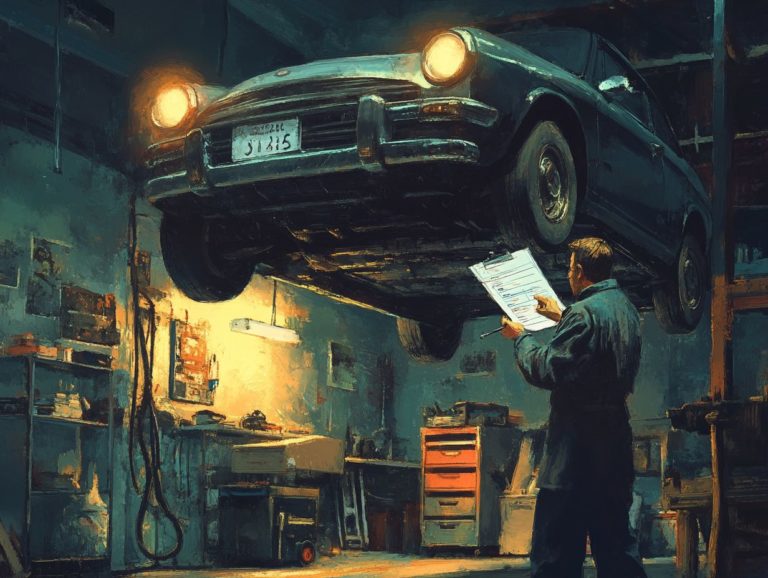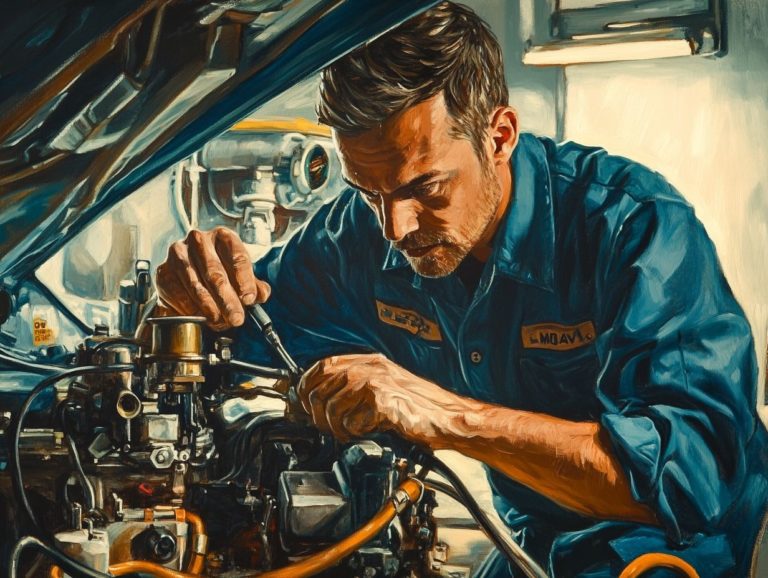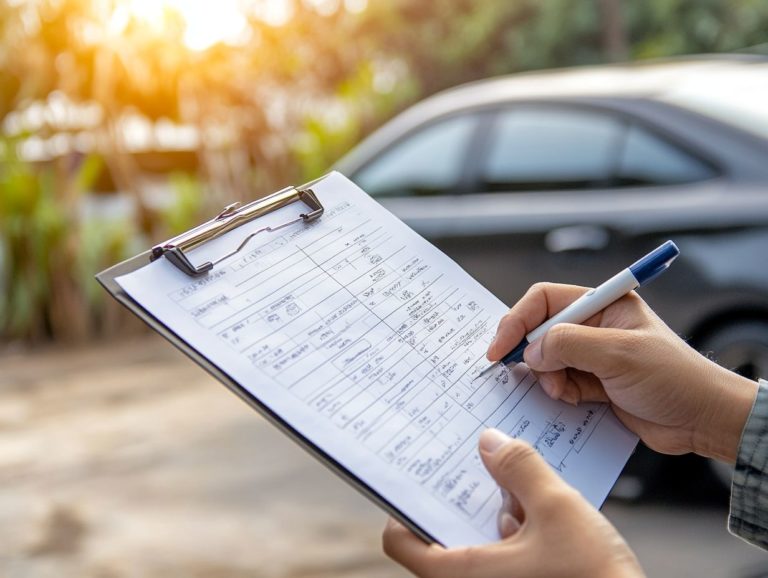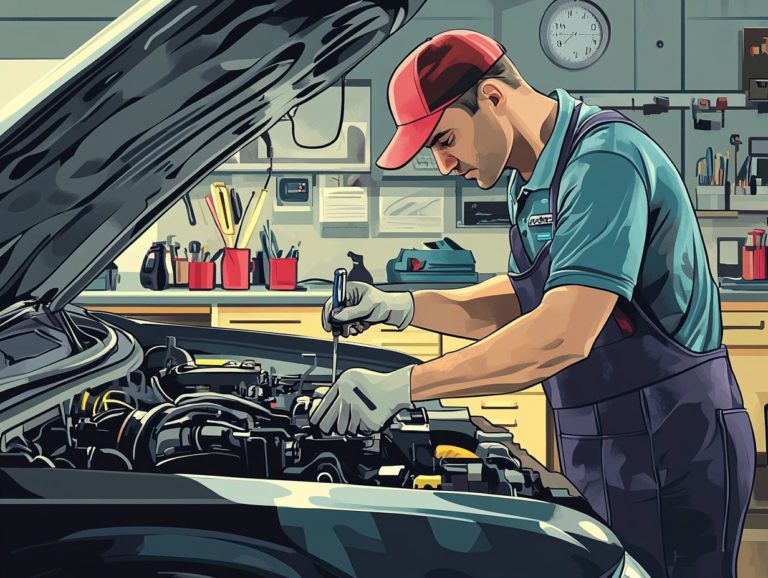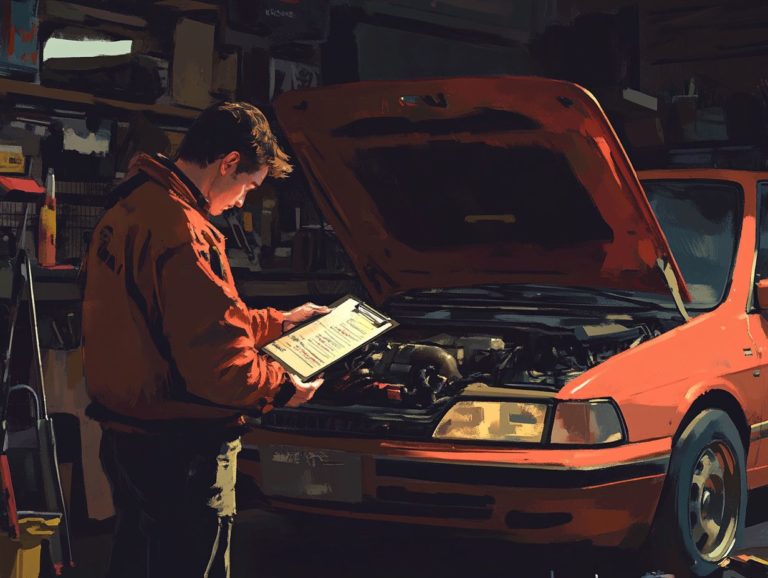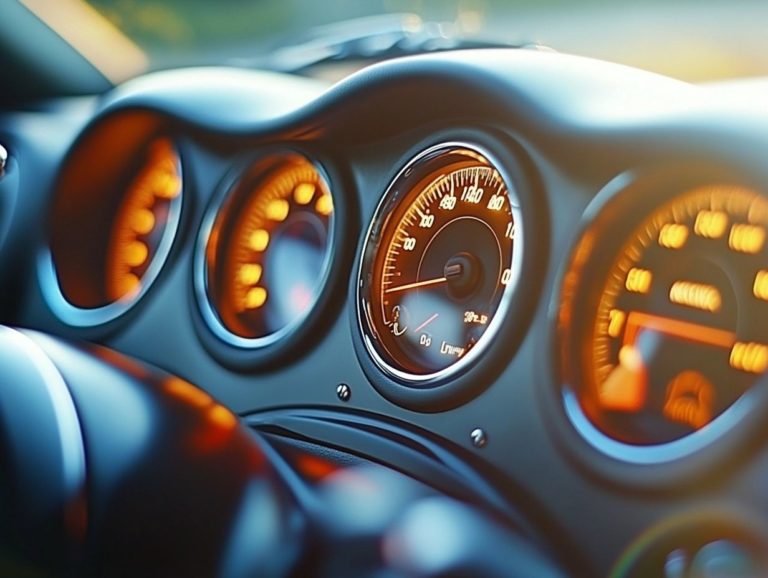How Weather Affects Car Inspections
Regular car inspections are essential for maintaining your vehicle’s safety and performance. You should be aware that weather conditions can significantly impact these assessments.
From temperature fluctuations to rain and wind, various environmental factors can influence how your car behaves. This article explores what a car inspection entails, examines how different weather elements affect specific car components, and provides practical tips for conducting thorough inspections even in less-than-ideal conditions.
Stay informed! Your vehicle s safety matters in any weather.
Contents
- Key Takeaways:
- Understanding Car Inspections
- Weather-Related Factors that Impact Car Inspections
- C mo el Clima Afecta Diferentes Partes de un Autom vil
- Consejos para Realizar Inspecciones de Autom viles en Climas Inclementes
- Importance of Regular Car Inspections
- Frequently Asked Questions
- 1. How does extreme weather affect car inspections?
- 2. Can weather affect the results of a car inspection?
- 3. How does hot weather affect car inspections?
- 4. In what ways does cold weather affect car inspections?
- 5. Can rain affect a car inspection?
- 6. What should I do if the weather is bad on the day of my car inspection?
Key Takeaways:

Extreme weather conditions can impact car inspections, making it important to adjust procedures and prepare accordingly.
Temperature and humidity can affect tires and brakes, while precipitation and wind can impact electrical components during car inspections.
Regular car inspections are crucial for ensuring safety and preventing costly repairs in the long run.
Understanding Car Inspections
Understanding car inspections is vital for maintaining your vehicle’s performance. Regular inspections help you identify potential issues before they develop into expensive repairs.
This process involves checking key parts, including the electrical system, engine cooling, and braking system, including battery maintenance checks.
Seasonal maintenance directly impacts your vehicle, enhancing its overall care and performance. This ensures your driving experience remains smooth and safe throughout the year.
What is a Car Inspection?
A car inspection is a thorough assessment of your vehicle’s condition and performance, focusing on safety and compliance with local regulations. This evaluation is designed to uncover potential safety hazards and ensure that all essential components are functioning as they should.
During the inspection, several key areas are examined:
- The braking system, vital for ensuring effective stopping power and overall safety.
- Tire traction, crucial for maintaining stability and handling on the road.
- Various electrical components, confirming that everything from your headlights to the battery is operating seamlessly.
By systematically reviewing these factors, car inspections help you avoid costly repairs and extend the lifespan of your vehicle. Ultimately, they play a pivotal role in fostering safe driving practices within your community.
Weather-Related Factors that Impact Car Inspections
Weather-related factors play a crucial role in car inspections. Extreme conditions, such as temperature fluctuations, humidity, and precipitation, can notably impact various vehicle systems and overall performance.
It’s essential to recognize how these elements can influence your car’s state, ensuring it remains safe and reliable under diverse weather conditions.
Temperature and Humidity
Temperature and humidity are vital factors influencing your vehicle’s performance in varying climates. When the heat rises, engine cooling becomes paramount.
Higher temperatures can lead to overheating, affecting your vehicle’s overall performance and efficiency. Excessive heat also takes a toll on battery performance, as batteries tend to lose efficiency in sweltering conditions.
When the roads heat up, tire traction can diminish, potentially compromising your safety. On the flip side, high humidity brings its own challenges.
Moisture can lead to corrosion and rust, putting metal components and electrical systems at risk if not managed properly. Understanding these elements is crucial for ensuring the longevity and reliability of your vehicle.
Precipitaci n y Viento

Precipitaci n y viento pueden presentar desaf os formidables al conducir. Esto impacta no solo la seguridad de su veh culo, sino que tambi n requiere medidas de cuidado espec ficas durante las inspecciones.
En clima lluvioso, el riesgo de hidroplaneo aumenta significativamente. Los neum ticos pueden perder contacto con la carretera, lo que puede llevar a una p rdida de control. Las revisiones regulares de la tracci n de los neum ticos son esenciales para asegurar un agarre ptimo. Los neum ticos desgastados o mal inflados pueden intensificar los peligros que presenta el agua acumulada en la carretera.
Los vientos fuertes pueden socavar a n m s la estabilidad de su veh culo. Es fundamental estar atento a las rafagas que podr an desviar su veh culo de su curso.
Adem s de las preocupaciones inmediatas de seguridad, es prudente considerar c mo la humedad inducida por la lluvia puede fomentar la corrosi n en varios componentes del autom vil. Esto subraya la importancia de implementar medidas efectivas de prevenci n de la corrosi n para preservar la integridad y longevidad de su veh culo.
C mo el Clima Afecta Diferentes Partes de un Autom vil
Comprender el impacto del clima en varios componentes de su autom vil es crucial para garantizar un rendimiento y seguridad ptimos, especialmente durante condiciones extremas.
Neum ticos y Frenos
Los neum ticos y frenos son esenciales para la seguridad de su veh culo. Su rendimiento puede verse dram ticamente influenciado por condiciones clim ticas como nieve, hielo o lluvias intensas.
Durante el mantenimiento estacional, es crucial revisar la tracci n de los neum ticos y los niveles de l quido de frenos. Estos elementos impactan directamente en la eficiencia del frenado. En condiciones adversas, ya sea en una ma ana helada o bajo una lluvia torrencial, tener la capacidad de detenerse de manera efectiva es vital para prevenir accidentes.
Las carreteras resbaladizas requieren un agarre ptimo, que solo se puede garantizar mediante una profundidad de banda de rodadura suficiente. El l quido de frenos se degrada con el tiempo y puede no funcionar correctamente bajo presi n.
Las inspecciones regulares mantienen sus neum ticos y frenos listos para enfrentar las diversas condiciones. Esto le brinda tranquilidad en cualquier temporada.
Componentes El ctricos
Los componentes el ctricos de su autom vil, incluyendo la bater a y los sistemas de aire acondicionado, son especialmente vulnerables a condiciones clim ticas extremas.
Estos extremos de temperatura pueden reducir significativamente la eficiencia y la vida til de la bater a, lo que a menudo lleva a fallos inesperados. En climas fr os, las reacciones qu micas dentro de la bater a se ralentizan, disminuyendo su capacidad para mantener una carga. Por otro lado, las temperaturas excesivamente altas pueden aumentar el riesgo de sobrecalentamiento y evaporaci n de electrolitos.
Las inspecciones regulares y el mantenimiento preventivo son esenciales para proteger la funcionalidad de su sistema el ctrico. Saltarse estas revisiones podr a llevar a un rendimiento general del veh culo disminuido, afectando desde la fiabilidad de arranque hasta el funcionamiento efectivo de la electr nica a bordo.
Al asegurar condiciones ptimas para estos sistemas, contribuye a una experiencia de conducci n m s suave y extiende la vida operativa de su veh culo.
Consejos para Realizar Inspecciones de Autom viles en Climas Inclementes
Realizar inspecciones de autom viles en climas inclementes requiere un enfoque refinado. Esto garantiza que cada sistema del veh culo sea evaluado meticulosamente para su seguridad y rendimiento.
Debe adaptar sus m todos para abordar los desaf os nicos que presentan las condiciones adversas. Esto asegura una evaluaci n completa y fiable.
Preparaci n para Condiciones Extremas

Prepararse para condiciones clim ticas extremas es esencial para asegurar la seguridad y fiabilidad de su veh culo durante las inspecciones.
Para lograr esto, comience con el mantenimiento adecuado de los neum ticos. Aseg rese de que sus niveles de inflaci n de neum ticos cumplan con los est ndares recomendados para un agarre y estabilidad ptimos en carreteras resbaladizas. Revisar el estado de su bater a tambi n es una buena idea; las temperaturas extremas pueden impactar su rendimiento y ciertamente querr evitar sorpresas desagradables.
No olvide inspeccionar regularmente sus limpiaparabrisas y niveles de l quido. Mantener la visibilidad durante el clima adverso es crucial.
Estos consejos de mantenimiento preventivo no solo refuerzan la resistencia de su veh culo, sino que tambi n mejoran su experiencia de conducci n. Esto le permite navegar tormentas invernales o lluvias con confianza.
Adjusting Inspection Procedures
Adjusting your inspection procedures based on weather conditions can significantly enhance how well you check your vehicle.
For instance, during humid weather, focus on rust prevention measures. Carefully examine areas where moisture tends to accumulate, like the parts of the car located under it, known as the undercarriage, and the wheel wells.
Conversely, when facing extreme cold, prioritize checking the battery. Frigid temperatures can drastically impact battery performance.
Using these weather-specific strategies boosts the effectiveness of your vehicle inspections. You can tailor maintenance checks to address potential issues before they escalate. Such proactive measures not only extend the life of your vehicle but also ensure your safety on the road.
Importance of Regular Car Inspections
Regular car inspections are essential for your safety and vehicle performance! They are a vital component of preventing expensive repairs in the future.
Ensuring Safety and Preventing Costly Repairs
Ensuring safety through regular inspections is directly linked to preventing costly repairs and maintaining optimal vehicle performance.
When you prioritize routine safety checks, you enhance your safety on the road. You also take significant steps toward minimizing the likelihood of expensive repairs in the future. Key systems that deserve your close attention during these inspections include:
- Brakes
- Tires
- Engine
For example, regularly inspecting brake pads and fluid levels can dramatically improve braking response. Checking tire tread depth and pressure enhances grip and fuel efficiency. A thorough review of the engine s components, from belts to oil levels, ensures seamless operation and longevity.
By embracing preventive maintenance, you can enjoy peace of mind knowing your vehicle is performing at peak efficiency.
Frequently Asked Questions
1. How does extreme weather affect car inspections?

Extreme weather conditions like heavy rain, snow, or extreme heat can make it difficult for inspectors to assess a car’s condition properly. These conditions can also impact the car’s performance, making it challenging to accurately test its safety and functionality.
2. Can weather affect the results of a car inspection?
Yes, weather can definitely affect the results of a car inspection. Extreme weather can impact the car’s performance and make it difficult for the inspector to assess its condition accurately. To ensure a thorough evaluation, it’s important to consider the best time of year for a car inspection, as this can lead to a complete inspection report.
3. How does hot weather affect car inspections?
Hot weather can cause issues with the car’s cooling system, which affects its overall performance and safety. Inspectors may have difficulty testing certain components, such as the air conditioning system, as extreme heat can impact their performance.
4. In what ways does cold weather affect car inspections?
Cold weather can cause the car’s fluids to thicken, making it difficult to assess their condition. It can also affect the car’s battery life and performance. Additionally, snow and ice can hinder inspectors’ access to certain areas of the car.
5. Can rain affect a car inspection?
Yes, rain can affect a car inspection in multiple ways. Wet roads can impact the car’s handling and performance, making it difficult for the inspector to test its safety properly. Rain can also make it hard to access and inspect certain areas of the car thoroughly.
6. What should I do if the weather is bad on the day of my car inspection?
If the weather is bad on the day of your car inspection, it is important to reschedule for a better day. This is vital for both the inspector’s safety and the accuracy of the inspection. Contact your local inspection facility to find a suitable time.

